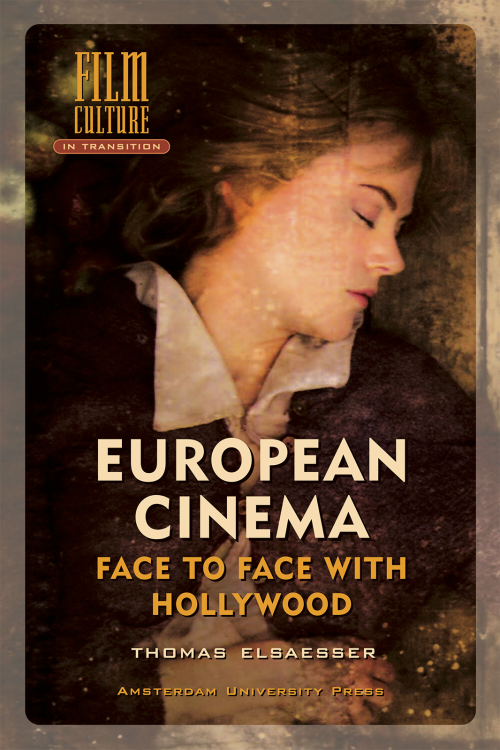In most countries of Western Europe, and especially in Britain, France, Germany, Denmark, Spain and Italy, the 1990s have seen a lively debate about the future of national cinema traditions. No longer can one assume the existence of distinct national styles, as they were once confidently identified with Italian neo-realism, with France's nouvelle vague, the New German Cinema, or with internationally famous art-cinema directors like Antonioni, Bergman, Losey, Fassbinder and Greenaway.
Contents
Preface
Thomas Elsaesser
Introduction
National Cinema: Re-Definitions and New Directions
European Culture, National Cinema, the Auteur and Hollywood [1994]
Thomas Elsaesser
ImpersoNations: National Cinema, Historical Imaginaries [2005]
Thomas Elsaesser
Film Festival Networks: the New Topographies of Cinema in Europe [2005]
Thomas Elsaesser
Double Occupancy and Small Adjustments: Space, Place and Policy in the New European Cinema since the 1990s [2005]
Thomas Elsaesser
Auteurs and Art Cinemas: Modernism and Self- Reference, Installation Art and Autobiography
Ingmar Bergman – Person and Persona: The Mountain of Modern Cinema on the Road to Morocco [1994]
Thomas Elsaesser
Late Losey: Time Lost and Time Found [1985]
Thomas Elsaesser
Around Painting and the “End of Cinema”: A Propos Jacques Rivette’s La Belle Noiseuse [1992]
Thomas Elsaesser
Spellbound by Peter Greenaway: In the Dark… and Into the Light [1996]
Thomas Elsaesser
The Body as Perceptual Surface: The Films of Johan van der Keuken [2004]
Thomas Elsaesser
Television and the Author’s Cinema: ZDF’s Das Kleine Fernsehspiel
Thomas Elsaesser
Touching Base: Some German Women Directors in the 1980s [1987]
Thomas Elsaesser
Europe-Hollywood-Europe
Two Decades in Another Country: Hollywood and the Cinephiles [1975]
Thomas Elsaesser
Raoul Ruiz’s Hypothèse du Tableau Volé [1984]
Thomas Elsaesser
Images for Sale: The “New” British Cinema [1984]
Thomas Elsaesser
“If You Want a Life”: The Marathon Man [2003]
Thomas Elsaesser
British Television in the 1980s Through The Looking Glass [1990]
Thomas Elsaesser
German Cinema Face to Face with Hollywood: Looking into a Two-Way Mirror [2003]
Thomas Elsaesser
Central Europe Looking West
Of Rats and Revolution: Dusan Makavejev’s The Switchboard Operator [1968]
Thomas Elsaesser
Defining DEFA’s Historical Imaginary: The Films of Konrad Wolf [2001]
Thomas Elsaesser
Under Western Eyes: What Does Žižek Want? [1995]
Thomas Elsaesser
Our Balkanist Gaze: About Memory’s No Man’s Land [2003]
Thomas Elsaesser
Europe Haunted by History and Empire
Is History an Old Movie? [1986]
Thomas Elsaesser
Edgar Reitz’ Heimat: Memory, Home and Hollywood [1985]
Thomas Elsaesser
Discourse and History: One Man’s War – An Interview with Edgardo Cozarinsky [1984]
Thomas Elsaesser
Rendezvous with the French Revolution: Ettore Scola’s That Night in Varennes [1989]
Thomas Elsaesser
Joseph Losey’s The Go-Between [1972]
Thomas Elsaesser
Games of Love and Death: Peter Greenaway and Other Englishmen [1988]
Thomas Elsaesser
Border-Crossings: Filmmaking without a Passport
Peter Wollen’s Friendship’s Death [1987]
Thomas Elsaesser
Andy Engel’s Melancholia [1989]
Thomas Elsaesser
On the High Seas: Edgardo Cozarinsky’s Dutch Adventure [1983]
Thomas Elsaesser
Third Cinema/World Cinema: An Interview with Ruy Guerra [1972]
Thomas Elsaesser
Ruy Guerra’s Erendira [1986]
Thomas Elsaesser
Hyper-, Retro- or Counter-: European Cinema as Third Cinema Between Hollywood and Art Cinema [1992]
Thomas Elsaesser
Conclusion
